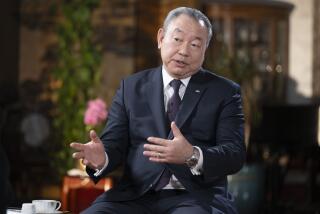Jiang Meets With High-Level Taiwan Envoy
- Share via
BEIJING — Taiwan’s top envoy to the mainland met with Chinese President Jiang Zemin on Sunday, capping the highest-level talks to be held in China between the rival governments in nearly 50 years.
While neither side claimed any breakthroughs, the meeting signaled a cautious rapprochement between Taipei and Beijing after both sides agreed last week in Shanghai to resume formal talks. China broke off their dialogue in 1995 in anger over a visit to the United States by Taiwanese President Lee Teng-hui.
Last week, the two sides agreed that Chinese envoy Wang Daohan will head to Taipei for the next round of talks early next year.
“The ice is not completely broken, but we hope it has melted a bit,” senior envoy Koo Chen-fu, chairman of Taiwan’s semiofficial Straits Exchange Foundation, told a packed news conference here after his meeting with Jiang.
Given the glacial progress of negotiations between the two governments, Koo said he had “no disappointments” about the meeting. He said that eventual talks between the presidents of China and Taiwan would be a “natural progression,” but he gave no timetable for such a meeting.
Members of the Taiwanese delegation privately voiced doubt that a summit will occur during the tenures of Lee and Jiang, whose terms are due to end in 2000 and 2003, respectively.
For the moment, the rapprochement should yield domestic political benefits for both Jiang and Lee. Analysts say Chinese conservatives and the military want faster steps toward reunification with Taiwan. And in Taiwan, stable mainland ties are a key issue in year-end elections, with both the ruling Nationalists and the opposition Democratic Progressive Party sounding conciliatory notes toward Beijing.
The Chinese side described Sunday’s 100-minute meeting as “cordial,” while Koo called it a “frank” and “tolerant” exchange of viewpoints on key issues.
Koo, 81, told reporters that he and Jiang talked extensively about the issue of democracy. He expressed hope that China will eventually be able to “share Taiwan’s experience” of democratization, including opposition parties and direct presidential elections.
“Jiang has his own ideas on democracy,” Koo added, saying that China will need time to find its own path to democracy “by trial and error.”
Earlier, Koo’s discussions of democracy with Vice Premier and former Foreign Minister Qian Qichen were received less than enthusiastically. A mainland spokesman quoted Qian as saying: “There are people in Taiwan who advocate so-called Taiwan-style democracy as the decisive factor in reunification. This is clearly unrealistic.”
In a snub to the Taiwanese delegation, Chinese authorities barred one of its members from the talks with Jiang. The delegate, Kang Ning-hsiang, was a founder of the pro-independence Democratic Progressive Party.
China also played down the importance--or at least the protocol level--of the talks by calling them a “courtesy meeting,” in the words of the New China News Agency. Jiang met Koo in the capacity of Communist Party general secretary, not as Chinese president, to avoid implying that Beijing was dealing with a government whose existence it refuses to acknowledge.
Taipei insists that, as a precondition for any talks aimed at reunifying it with China, Beijing recognize the Republic of China on the island as a political entity. Beijing, meanwhile, claims that it is the sole legitimate government of China, of which Taiwan is a part, and that the Republic of China ceased to exist in 1949 after the Communists vanquished the Nationalists.
“Do we not exist?” Koo asked rhetorically.
Currently, more than 160 countries recognize Beijing as China’s government, while only 27 countries maintain diplomatic ties with Taipei.
More to Read
Sign up for Essential California
The most important California stories and recommendations in your inbox every morning.
You may occasionally receive promotional content from the Los Angeles Times.













